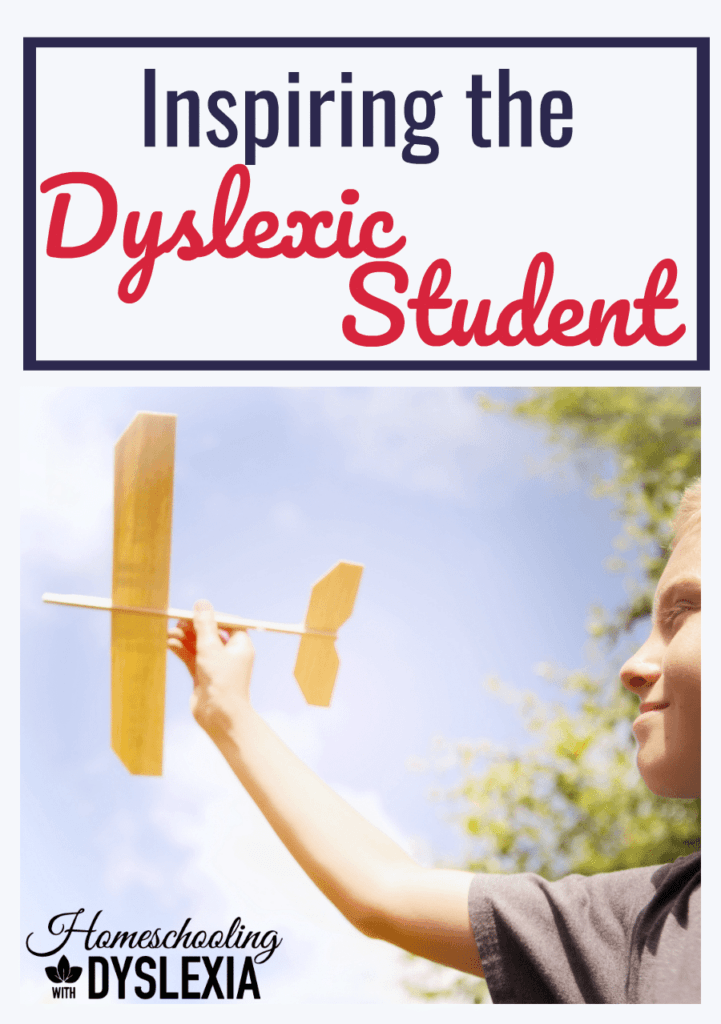The key to inspiring the dyslexic student to push through the difficulties they experience with reading, writing, and life in general, is to help them find that vision for themselves. How can you do that? Let’s find out!

When my oldest daughter was 8 years old, she had an all-consuming love of animals. She had wild plans to turn our backyard into a petting zoo. {Nearly accomplished that too!} She loved to go to the library and check out tall stacks of books about all of the animals she dreamed of owning. The trouble was that when she was 8 years old, she also had a baby brother and sister, born a mere 13 months apart. I was a busy mom; too busy to read all of these mountains of animal books piled around the house.
We would sit when we could and I’d read maybe a chapter or two before life got real and I was doing what a mom of four kids under 10 does. Hard to remember now, it’s all a blur, but you know what I mean.
That is when it happened. You see, my daughter was (and still is) dyslexic. She couldn’t read more than 30% of the words in those books on her own. Yet something happened in those busy days of raising and homeschooling a houseful of small kids – that girl pushed herself to figure out the words and then the sentences and eventually the entire books that contained the information that she so longed to acquire.
She was fueled by her passion.
My daughter is certainly not unique in this regard. God has gifted all of us, young and old, with talents – something that makes us want to get up in the morning.
The key to inspiring and motivating our dyslexic kids {and non-dyslexic ones for that matter} to push through the difficulties they experience with reading, writing and life in general, is to help them find that vision for themselves.
For example, if one of your kids has a strong desire to be a missionary in China, he or she will be highly motivated to learn Chinese – a difficult language to master. If there is a strong practical benefit for your student to do something, something that brings them closer to that dream or passion, they will push through the difficulties to reach their final destination.
How do you help your kids find their gifts?
Talents are God-given. God has created all of us with a purpose. Do your kids know that? I remind my kids often that they were made with a purpose and that they can know what that is if they ask God.
For we are His workmanship, created in Christ Jesus for good works, which God has prepared beforehand that we should walk in them. Ephesians 2:10
Pray that God would help them find their calling.
Talk with your kids about what they are interested in. Kids should be spending a good part of their day exploring their interests. Help them to find books, videos and web sites that help them grow in knowledge.
Observe your kids to see what it is that makes them shine. What floats their boat?
Nurture creativity. Learn about, remark and wonder at the achievements of others. Speculate on how they accomplished their goals. Read widely of adventurers, scientists, missionaries and business people. Encourage dreams and possibilities.
It really isn’t so difficult to see the interests and passions of our kids. The key is allowing the time for these interests to develop. Give kids time to play, to dream and possibly most important – to be bored.
Stop running them from class to class and activity to activity and let them be. And while you’re at it, maybe you’ll remember that old dream of yours.







I have to say through the trial and tribulations we are doing just that. I am dyslexic and my two sons are dyslexic. We all three learn differently and I have to remember just because I can learn something this way they might not grasp it. Even though they are great readers they will read to find information, as I did, about their favorite things. Instead of trying to fit them into that ‘cookie cutter’ we just live and let live. It works for us.